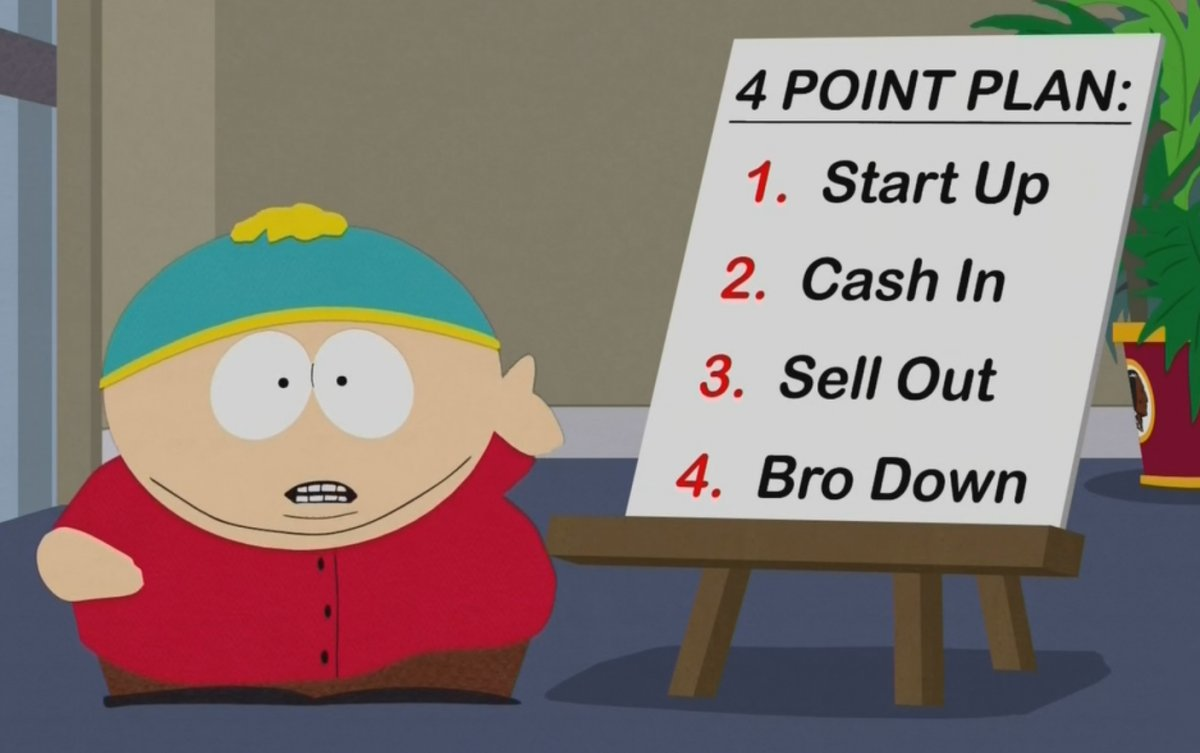Today startups appear for the sake of a startup, and not the realization of the idea

A startup is defined as a fast-growing company with a short history of operations. It's official. When the startup was not yet mainstream . The perception of a startup differs depending on the country in which it is located. In the USA, for example, a startup is a company with an age of existence up to 5 years and a profit of one million dollars (namely, profit, and not revenue or turnover). In Europe, a startup is called a company with a legal entity that has been open for three years or less.
What does the image of a startup look like in the minds of most? A team of young (necessarily) people who are free from costumes, tough graphics (they often set the floating frame too wide, devoting a lot of time to a modest result), who are different from everyone, obsessed with the idea, sleep little. They are rarely burdened by additional family obligations.
Who is it?
Everything starts always beautiful. Idea, investment, vigorous work. Healthy (?) Lifestyle and views of the future, where the world obeys only us (think in every startup). Oh well. There are great startups. They are very few. Some of the entire history: Rovio, Netflix, Graigslist, Groupon, Linkedin, Ebay, HP, Yahoo !, Amazon, Google, Apple. They talk a lot about them, because everyone knows them .
')
Less talk about those who have failed, they simply do not know. I think they are even more than can be found on the network. For example: Secret, Clinkle, FOBO, Circa News, Critica, orat.io, Cusoy, College Inside View. These lists are like a sad chronicle.
Who are they? What they were doing? I do not know. Maybe you think otherwise. But the fact is that they crashed.
If you can not do something, it is better not to do
Startups are like a closed society. Remember how it was Fincher in the "Social Network". Everyone is pleased to feel special, involved in something closed. Selection, rights, privileges. See or be? Between the two principles is lost meaning. It turns out society for the sake of society, and not society for the exchange of ideas and ideas and other things. Meaning shifts from “fiery ideas” to a strange kind of elite groups. A buzzword, good conditions.
But the truth, if you look. What we see. Routines, which were previously designed to rally the team, for example, to mark the next thousand users with a drink, are now just for the party. None of them speaks about their future plans with burning eyes, but they just sit with their phone from time to time exchanging links. Well, maybe not always, but there is still a trend.
And why is this happening. Maybe there are no ideas? A chip is still relevant. Maybe laziness and apathy? Maybe you do not need startpapy. It may be worthwhile to stop and develop the already existing, and not multiply mindlessly. It is too easy to create a startup, like pressing Ctrl + C.
And here are these hipster startups with setters for smoothies in their backpacks. I don't mind eating healthy. I am for. But we have all seen enough, as this is raised to a cult for the sake of worship. Do not do it this way. Snobbery is not a very healthy movement. As well as closed societies with no idea. The desire to be an elite can hide behind a complex. Buddhism is better. Keep it simple and build Apple. Joke. Partly.
Why do startups disappear? There are many reasons, but there is one fundamental thing - a startup has ceased to be a place where ideas are cultivated. He became a party of infantile people who gather in order to gather. We recall the Apple principle that technologies are created not for the sake of technology, but in order to change the world. That's right, and if you drop the pathos, it turns out that technology is needed to make life better, more convenient, different. But not just that they were. That's what many startups lost.
Many people want to make a second Google, Apple, Coca-Cola, and more. But after all the second such will not be. I do not remember a single fact from the history of the creation of icon companies, so that in the beginning they would like to do something similar. They wanted to make a new one and they created a unique one. Although all these rows of replicas, which also seem to be reaching something, too. Well, yes, the exhaust was exactly to get it. But they brought nothing new to the world. If you dig deeper, then even selected. We made a startups to earn extra money. To earn extra money to bribe something, reapply and live somehow ...
It would be good to use the Pareto principle . Less hype, more result. When another idea is about to hatch into a startup, it would be nice for the authors to ask themselves a few questions on the type of Socratic three screens .
- Is it true that what you are going to embody is something creative and changing reality for the better, at least a little?
- Is it really necessary to implement this idea?
- Is the idea honest, earning not on user fraud?
Do not you think that startups began to appear only to be mentioned in the article on Medium? And important investments and expectations are lost. Summing up the popular reasons for the collapse of young companies from year to year, we get this:
- lack of experience and stability in the team and management experience;
- lack of analysis of target consumers;
- bad attempts to interest investors.
It is necessary to prepare. Really prepare, and not to rebrand the next version of the messenger and add a few new, not so necessary, functions.
How to be a good startup?

What steps can be taken to preserve the spirit of a startup? For example, to protect the bulk of employees from information about losses and profits. Let the few who know the responsibility for it know about it. This is how conditions are created in which talented people give rise to grandiose ideas, and mediocrity are self-eliminated. We need small groups of people working on the task. Instead of those big teams where several people can be responsible for the same thing.
So did Apple. Their methods of operations and management can be guidelines for many young companies and a real school for entrepreneurs. They did not seek profit and got it. Paradoxically. A good idea will always be rewarded.
Choose the right place to start a business. In the elite valleys everything is bureaucratic and ponderous. You can just sit on any island in Pacific Asia for three. You can move to Silicon Valley later, after the first successes.
And the truth is, to hell with it all - playing with children is great. So far they have not fouled up their first startup. Haha
Source: https://habr.com/ru/post/313158/
All Articles